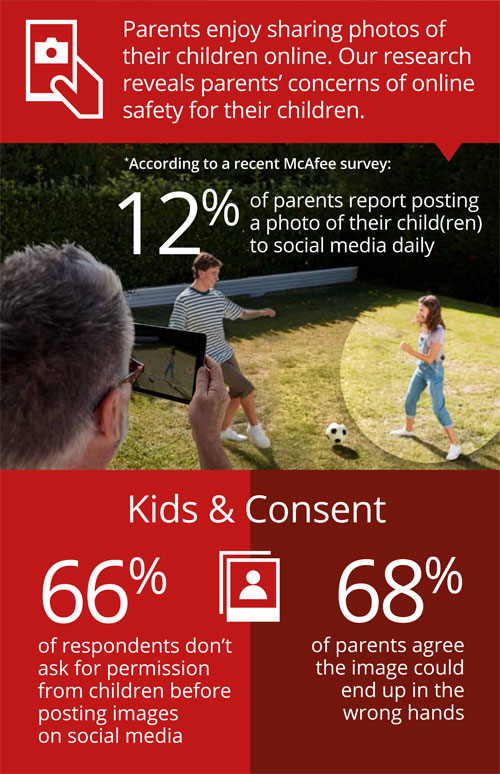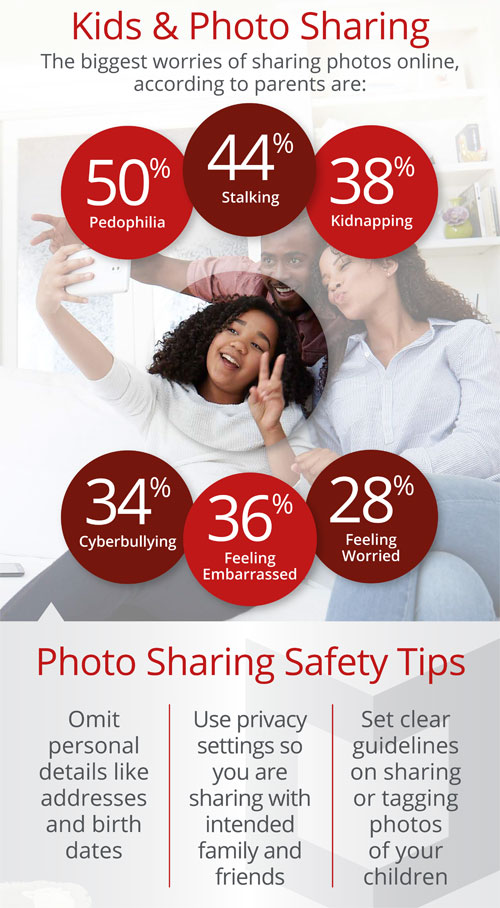Alex Merton-McCann Social Sharing Interview

New McAfee Survey Finds Parents Ignore their own Concerns of Sharing Images of their Children Online
McAfee, the device-to-cloud cybersecurity company, have announced its latest survey found 30% of Australian parents post a photo or video of their child at least once a week on their social media accounts, with 12% posting at least once a day. This is despite most parents understanding the risks associated with sharing images of their children online, including pedophilia (50%), stalking (44%), kidnapping (38%) and cyberbullying (34%).
However, despite voicing these worries, this concerns doesn't translate into action, as many continue to post snaps of their kids in exchange for likes and comments on social media. For example, almost half (40%) of the parents surveyed admit that they have or would share a photo of their child in their school uniform despite the risk of giving away personally identifiable information. However, the majority (77%) of parents are only sharing photos of children on private social media accounts.
"Only sharing photos of children on private social media accounts is certainly a good first step, but there is much more that needs to be done to ensure parents are protecting their children's safety online," said Alex Merton-McCann, McAfee's Cybermum in Australia. "As the survey makes obvious, parents are not giving enough consideration to what they post on social media and how it could harm their children. If images get into the wrong hands, they can be used to gather information like their birth dates, home address, school, or even the child's full name, which is a scary thought for any parent."
While it's clear that parents do consider physical risks to their children's safety, results indicate less concern about the future impact or emotional risks. Only 28% of parents are concerned that posting an image of their child online could lead to worry or anxiety, and just over a quarter (28%) considered that their child could be embarrassed by images they have shared, but they post them anyway. Emotional side effects should not be ignored. According to a survey from ComRes, more than one in four children between 10 and 12 years old feel embarrassed, anxious or worried when their parents post pictures of them online. Interestingly, it appears mums consider the embarrassing side effect more than dads, with 35% of dads assuming their children will get over or not care about embarrassing content compared to just 24% of mums.
 "As a parent I know how important it is to immortalise those big moments, like the first day of school, through pictures," continued Merton-McCann. "The desire to share those precious images with friends and family via social channels is understandable, but parents should consider the emotional and security risks of posting on their children's behalf. In addition to sometimes embarrassing their children, parents need to know that it can also have damaging ramifications on their digital and even physical safety. I caution parents to think twice about what they share publicly."
"As a parent I know how important it is to immortalise those big moments, like the first day of school, through pictures," continued Merton-McCann. "The desire to share those precious images with friends and family via social channels is understandable, but parents should consider the emotional and security risks of posting on their children's behalf. In addition to sometimes embarrassing their children, parents need to know that it can also have damaging ramifications on their digital and even physical safety. I caution parents to think twice about what they share publicly."
Many parents (60%) don't consult their child before posting their image online. In fact, 37% of parents believe they have the right to share images of their children online without their consent.
Other key findings include:
The average age parents believe they should start asking their child for consent before posting images of them on social media is around 10 (9.56). Interestingly, this is the same age as the age of responsibility for Australia.
The majority of parents (82%) said they haven't/would never share an image of their child under 2 years' of age without clothes on over social media
Interview with Alex Merton-McCann, McAfee's Cybermum in Australia
Question: Can you talk us through some of the findings of the recent McAfee research?
Alex Merton-McCann: Despite more than two-thirds of parents agreeing that the photos they post of their children online could end up in the wrong hands, more than a quarter are still posting a picture of their child online at least once a week. Further to this, almost half of Aussie parents are sharing photos of their children wearing their school uniform online despite saying they are concerned about risks that could arise from sharing personally identifiable information, like stalking (44%) and kidnapping (38%). The one comfort that we can take away from this research is that more than three quarters of parents are only sharing photos of their children on private social media accounts. In saying that, anything posted online should be considered publically available.
Question: What surprised you most about the recent McAfee research?
Alex Merton-McCann: The majority of parents are aware that there is some risk involved when posting photos of our children online. What surprises me is, as parents, we are not turning this knowledge into action. It seems many are putting their social media feeds before the safety and wellbeing of their kids, which is a big concern. Parents need to take a step back and think about their social media habits to make sure they are doing what's best for their kids in the long run.
Question: What are the risks associated with sharing images of children online?
Alex Merton-McCann: Some of the biggest security risks parents are concerned about when sharing images of our children online include paedophilia (50%), stalking (44%), kidnapping (38%) and cyberbullying (34%). However we often underestimate the emotional risks involved, with a survey from ComRes revealing that 1 in 4 children between 10 and 12 years old feel embarrassed, anxious or worried when their parents post pictures of them online. This is a new issue for many parents to navigate, and it's important that they consider not just the physical safety but also the emotional wellbeing of their children when posting on social media.
Question: Why do you think many parents understand the risks but share photos of their children, anyway?
Alex Merton-McCann: Social media gives us the opportunity to share some of the most exciting moments of our lives with our closest friends and family. As parents, most of these exciting moments involve our children's achievements. When trying to express our love or pride in our children through posting photos of them online, we often lose sight of the risks of doing so.
Question: Should parents consult their child before posting a photo of them, on social media?
Alex Merton-McCann: It is always best to ask your children, especially as they get older, for permission before posting a photo of them online. No matter how harmless you may think the photo is, as soon as you post it online it becomes part of your child's digital identity for the rest of their life, and that is something that they should be able to have some control over. As we raise a generation of digital natives, there are so many potential future impacts that we just don't know about yet, but that we need prepare for by being careful about the images we share of our kids online.
Question: What measures can parents take if they do want to post photos of their children, online?
Parents should only be sharing photos of their children to their intended audience, and the best way that they can ensure that this is the case is to check the privacy settings on whatever social media platform they use to make sure their posts are only shared with confirmed connections.
It is also really important that parents set clear ground rules for the types of photos posted of their children online, not only for themselves, but their friends and family also. We shouldn't be afraid to ask friends or family to remove posts we feel might have negative impacts on our children.
Question: What advice do you have for parents to safely share images of their children, online?
Alex Merton-McCann: Watch out for geo-tagging. Many social networks will tag a user's location when a photo is uploaded. Parents should ensure this feature is turned off to avoid disclosing their location. This is especially important when posting photos away from home.
Lock down privacy settings. Parents should only share photos and other social media posts with their intended audience. Services like Facebook and Instagram have features that allow posts to be shared only with confirmed connections, but everything posted on a social network should be treated as if it's public.
Set ground rules with friends, family and children. Be clear with friends and family about guidelines when posting images. These rules can help avoid unwanted situations where a family member has shared photos without explicit permission. Don't forget that these ground rules should also apply to parents to protect the children in the images from embarrassment, anxiety or even cyberbullying.
Interview by Brooke Hunter
MORE




